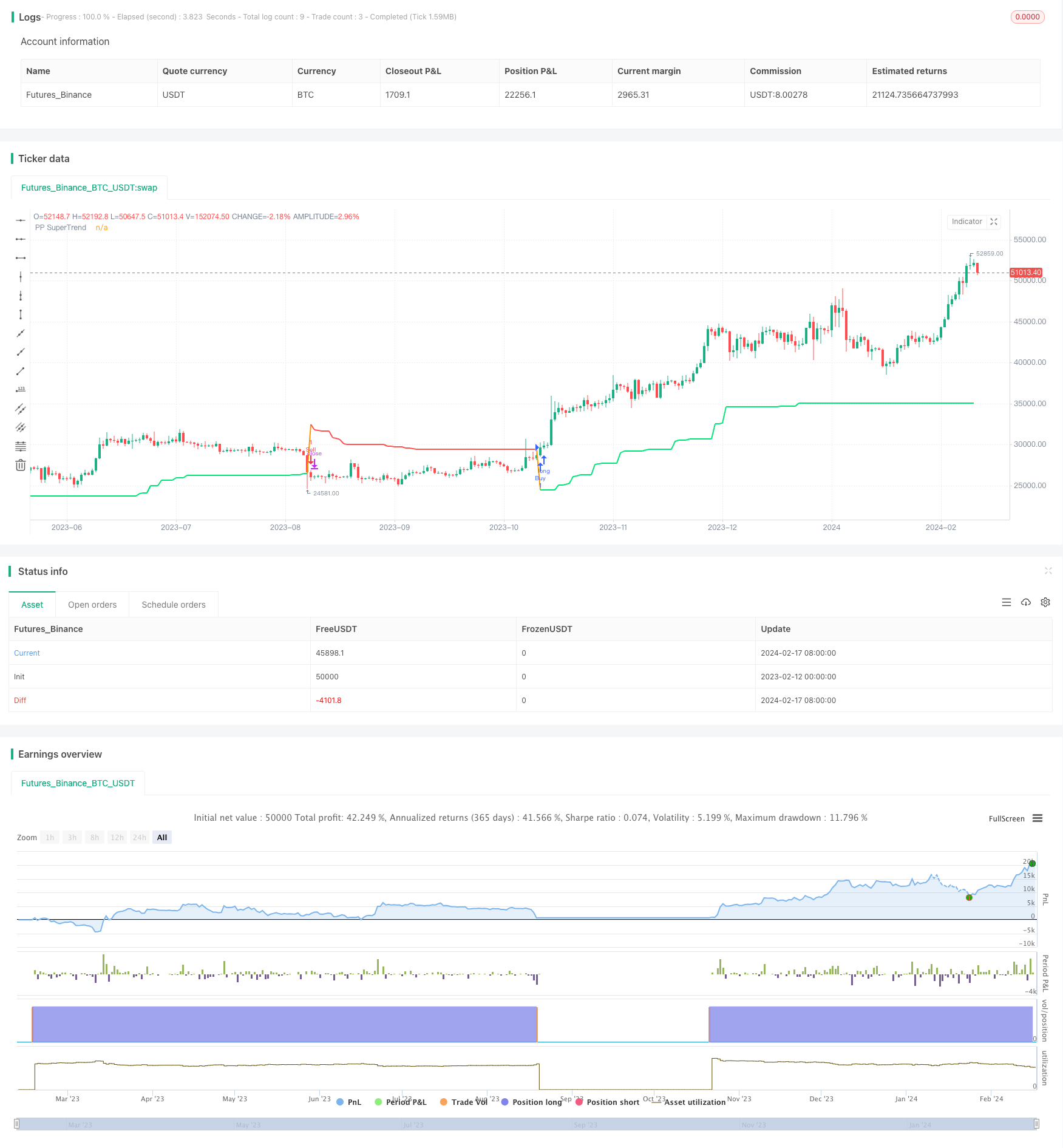ADX-Filtered SuperTrend Pivot Trading Strategy
Author: ChaoZhang, Date: 2024-02-19 15:01:36Tags:

Overview
This strategy combines SuperTrend pivot points and the ADX indicator for high-frequency trading. The SuperTrend lines dynamically calculate the latest support and resistance levels to determine price trends and generate trading signals. The ADX indicator measures trend strength and acts as a filter, only taking trades when the trend is strong enough.
Strategy Logic
Calculate pivot support and resistance lines. Take the closing price and add/subtract an ATR range above and below. Breaks of these lines signal trend reversions.
ADX determines trend strength. High ADX values indicate a strong trend.
Combine both for trade signals. Go long/short only on pivot breaks and high ADX.
Advantage Analysis
Advantages of this strategy:
Dynamic SuperTrend lines quickly identify breakouts.
ADX filter avoids false signals during range-bound markets.
Good risk-reward ratio and drawdown control.
Risk Analysis
Risks of this strategy:
Gap moves can invalidate SuperTrend lines.
Poor ADX threshold setting impacts performance.
High trading frequency increases transaction costs.
Solutions:
Optimize parameters to allow wider breakout ranges.
Test for better ADX values.
Reduce trade frequency.
Optimization Directions
Areas for improvement:
Optimize ATR multiplier for more robust lines.
Test different ADX parameters.
Add stop-loss to limit losses.
Conclusion
This strategy combines the strengths of SuperTrend and ADX to identify high-probability trend reversal points, filtered by ADX for quality. With parameter tuning and mechanisms adjustments, it can become a steady profit-generating high-frequency strategy.
/*backtest
start: 2023-02-12 00:00:00
end: 2024-02-18 00:00:00
period: 1d
basePeriod: 1h
exchanges: [{"eid":"Futures_Binance","currency":"BTC_USDT"}]
*/
//@version=4
strategy("STPP20 + ADX", overlay = true)
///////////////////////////
// SuperTrend + Pivot Point
//////////////////////////
src = input(close, title="EMA Source")
PPprd = input(defval = 2, title="Pivot Point Period", minval = 1, maxval = 50)
AtrFactor=input(defval = 5, title = "ATR Factor", minval = 1, step = 0.1)
AtrPd=input(defval = 20, title = "ATR Period", minval=1)
float ph = na
float pl = na
ph := pivothigh(PPprd, PPprd)
pl := pivotlow(PPprd, PPprd)
float center = na
center := center[1]
float lastpp = ph ? ph : pl ? pl : na
if lastpp
if na(center)
center := lastpp
else
center := (center * 2 + lastpp) / 3
Up = center - (AtrFactor * atr(AtrPd))
Dn = center + (AtrFactor * atr(AtrPd))
float TUp = na
float TDown = na
Trend = 0
TUp := close[1] > TUp[1] ? max(Up, TUp[1]) : Up
TDown := close[1] < TDown[1] ? min(Dn, TDown[1]) : Dn
Trend := close > TDown[1] ? 1: close < TUp[1]? -1: nz(Trend[1], 1)
Trailingsl = Trend == 1 ? TUp : TDown
// Lines
linecolor = Trend == 1 and nz(Trend[1]) == 1 ? color.lime : Trend == -1 and nz(Trend[1]) == -1 ? color.red : na
plot(Trailingsl, color = linecolor , linewidth = 2, title = "PP SuperTrend")
bsignalSSPP = close > Trailingsl
ssignalSSPP = close < Trailingsl
///////
// ADX
//////
lenADX = 14
th = 25
TrueRange = max(max(high-low, abs(high-nz(close[1]))), abs(low-nz(close[1])))
DirectionalMovementPlus = high-nz(high[1]) > nz(low[1])-low ? max(high-nz(high[1]), 0): 0
DirectionalMovementMinus = nz(low[1])-low > high-nz(high[1]) ? max(nz(low[1])-low, 0): 0
SmoothedTrueRange = 0.0
SmoothedTrueRange := nz(SmoothedTrueRange[1]) - (nz(SmoothedTrueRange[1])/lenADX) + TrueRange
SmoothedDirectionalMovementPlus = 0.0
SmoothedDirectionalMovementPlus := nz(SmoothedDirectionalMovementPlus[1]) - (nz(SmoothedDirectionalMovementPlus[1])/lenADX) + DirectionalMovementPlus
SmoothedDirectionalMovementMinus = 0.0
SmoothedDirectionalMovementMinus := nz(SmoothedDirectionalMovementMinus[1]) - (nz(SmoothedDirectionalMovementMinus[1])/lenADX) + DirectionalMovementMinus
DIPlus = SmoothedDirectionalMovementPlus / SmoothedTrueRange * 100
DIMinus = SmoothedDirectionalMovementMinus / SmoothedTrueRange * 100
DX = abs(DIPlus-DIMinus) / (DIPlus+DIMinus)*100
ADX = sma(DX, lenADX)
//////
// MA
/////
lenMA = 21
srcMA = input(close, title="Source")
offsetMA = input(title="Offset", type=input.integer, defval=0, minval=-500, maxval=500)
outMA = sma(srcMA, lenMA)
// Buy - Sell Entries
buy = bsignalSSPP and outMA < close and ADX > th
sell = ssignalSSPP
if (buy)
// .order // Tuned version
strategy.entry("Buy", strategy.long)
if (sell) and (strategy.position_size > 0)
strategy.order("Sell", false, when = sell)
- Multi-factor Quantitative Trading Strategy
- Trend Following Strategy Based on Smoothed Deviation
- Ichimoku Cloud Oscillator Trading Strategy
- Double Bottom Reversal Mean Reversion DCA Grid Strategy
- Assassin's Grid B – A Dynamic Grid Trading Strategy
- Multi Timeframe Moving Average Crossover Strategy
- Adaptive Zero Lag Exponential Moving Average Quantitative Trading Strategy
- Momentum Brick Strategy
- Volatility Breakout Reversal Trading Strategy
- Candle Patterns Trading Strategy
- Momentum Moving Average Reversal Strategy
- Momentum Moving Average Crossover Trading Strategy
- Momentum Trend Synergy Strategy
- Rational Trading Robot Powered by RSI Strategy
- DYNAMIC MOMENTUM OSCILLATOR TRAILING STOP STRATEGY
- Bugra Trading Strategy Based on Dual Kinetic Moving Average
- Fractal and Pattern Based Quantitative Trading Strategy
- Reversal Fluctuation CAT Strategy
- Price Channel VWAP Trading Strategy
- The Interwoven Moving Average Crossover Strategy